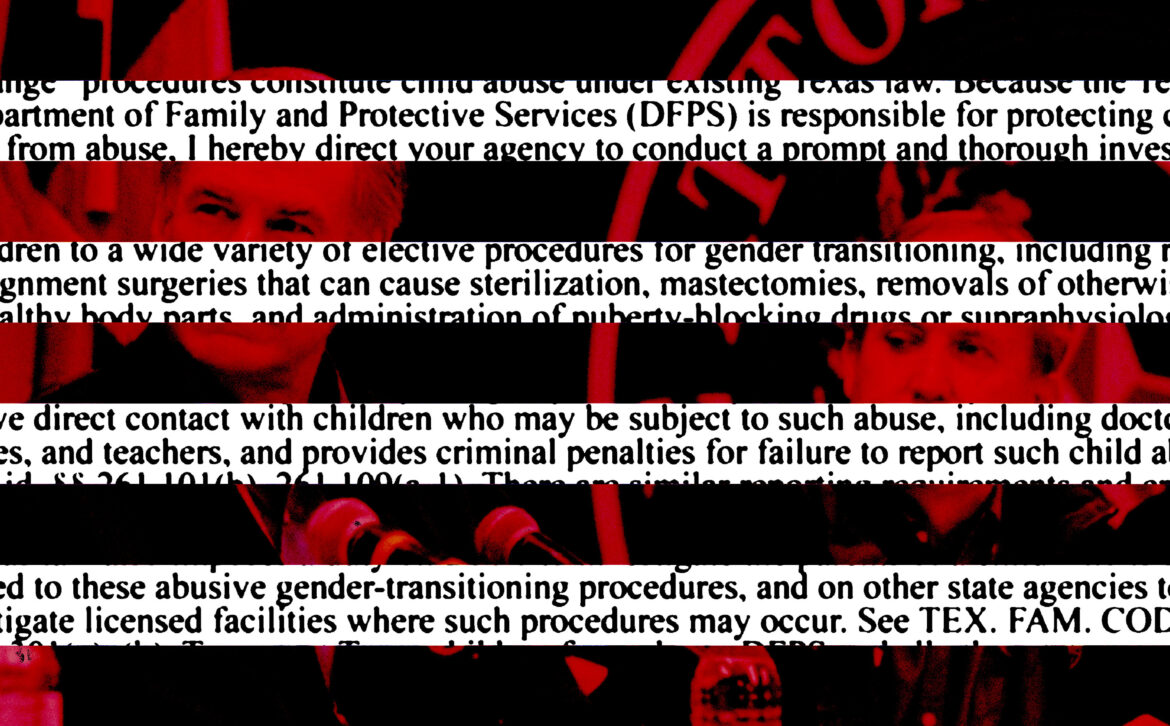A string of bills and policies concerning the LGBTQ community in the U.S. have gained vast attention and pushback this year. The continued transphobia and homophobia that fuels this legislation is dangerous for queer people around the country and detrimental to the existence of queer youth.
Texas Gov. Greg Abbott wrote a letter addressed to the commissioner of the Texas Department of Family and Protective Services on February 22 in which he asserted that gender-affirming treatments and procedures for transgender children could be considered “child abuse” under Texas law, in line with a previous statement from Texas Attorney General Ken Paxton. They state that these procedures should only be performed when a person reaches the full age of consent — 18 years old — and anything before should be considered a criminal act. Paxton called for an “investigation” of instances of gender-affirming practices in the state, which could range from the prescription of hormone blockers to surgeries and other procedures.
If this interpretation of Texas law is upheld, it will affect family members, doctors, teachers and all other professionals involved in a child’s gender-affirming journey. It would effectively punish people for supporting their queer children and prosecute practicioners of vital healthcare as child abusers.
This persecution of LGBTQ people was further exacerbated by the Parental Rights in Education bill, also known as the “Don’t Say Gay” bill, introduced by Florida Rep. Joe Harding and signed into law by Florida Gov. Ron DeSantis on March 28. This bill prohibits the teaching of topics regarding sexual orientation and gender identity in Florida elementary schools from kindergarten to third grade, and after that, only if it is deemed “age appropriate or developmentally appropriate.” This law can have effects throughout the entire grade system in Florida, allowing schools and teachers to take advantage of its vague language and implement it however they see fit — to the detriment of LGBTQ students and families.
Rep. Harding has claimed that the law is not intended to prevent discussion of LGBTQ history. Critics cited in The Washington Post argue that since sex education is banned until fifth grade in Florida anyway, the law cannot “protect” young children and has no reason to exist. It only serves to limit a student’s self-expression.
Jade Kai, a doctoral student and graduate instructor in the Women’s, Gender and Sexuality Studies Department at Stony Brook University, sees the legislative action as an attempt to exclude diversity in gender and sexuality from young Americans’ value systems.
“Since children are seen as the future, and in the eyes of the state children are expected to reproduce U.S. American values, these politicians hinder education about the vast range of sexual and gender expressions and identities that exist and target supportive parents of gender nonconforming children,” Kai said.
The law also requires schools to share information with a child’s parents about any resources the child seeks for physical or mental support from the school, except in cases of suspected abuse or neglect. A student could seek out resources for a range of reasons, including issues about gender or sexuality. This requirement could make students feel uncomfortable confiding in counselors or other staff members at their schools, reducing the accessibility of mental health resources for kids. Requiring schools to disclose this information to parents would also be harmful for queer children who come from families who do not accept their identity.
Legislation like this indicates that the conservatives behind these bills cannot accept the idea of a person in a child’s life being supportive of their gender or sexual identity, revealing deeply rooted oppressive ideologies. Kai says long-standing cis-het norms in the U.S. have contributed to such oppression.
“This concept of the ‘natural’ perpetuates the idea that transgender people who get gender-affirming procedures like chest surgeries, genital surgeries and hormone replacement therapy are mentally unstable and that there is something inherently ‘unnatural’ or ‘wrong’ with them, along with the idea that body modification is ‘mutilation,’” Kai said.
Studies from the Centers for Disease Control and Prevention have shown that adolescents and teens who identify as LGBTQ are at a higher risk of suicide and mental health challenges such as depression and anxiety. About 34% of queer kids experience bullying from their peers, which can contribute to suicidal thoughts and tendencies — and queer kids experience these problems at disproportionately higher rates. The 2019 national Youth Risk Behavior Survey reported that 14.5% of heterosexual high school students considered suicide, compared to 46.8% of lesbian, gay or bisexual students.
If children do not feel safe discussing their challenges with adults at school, how will they be able to express themselves and explore their identities? If families are penalized for accepting and encouraging their children to explore their gender and sexual identities, these kids may internalize an unhealthy shame about these identities.
“These mandates do not stop people from being queer, but they do increase shame and violence toward those who are,” Kai said.
The repression and fear linked to these feelings will have a mental toll on many queer children, with detrimental effects that can last throughout their entire lives. According to the Trevor Project’s 2021 National Survey on LGBTQ Youth Mental Health, when LGBTQ youth have a space to express their identities freely, they report lower rates of suicide attempts. It is essential that these spaces are accessible for queer children and teens.
Abbott, Paxton and other supporters of anti-LGBTQ policies pose their efforts as pleas to protect children from “abuse.” In reality, preventing children from gaining access to gender-affirming experiences that improve their quality of life would be truly abusive. Politicians in favor of such legislation claim they seek to strengthen the family, yet they are actively trying to condemn families that do not fit their perceived ideal.
“‘To strengthen the family’ actually means to enforce families to reproduce structures of power that harm women, people of color, immigrants, disabled people, Indigenous people and those in the LGBTQ+ community,” Kai said.
In other debates, many of these politicians claim to be against government regulation of bodies. Abbott banned vaccine and mask mandates in Texas so people could make public health decisions based on their “personal conscience,” yet he considers government involvement necessary in consensual gender-affirming procedures that only affect an individual. This hypocrisy proves that this fight is not about human rights — it’s about upholding a mythical norm of what is acceptable in our society, making laws work for specific groups of people while ostracizing others.
As members and allies of the LGBTQ community, we must educate ourselves on discriminatory laws and the potential effects that they will have. This is an election year for Abbott, but Texas and Florida are not the only states pushing this type of legislation. Lawmakers in Oklahoma, Arizona, Utah, Iowa and Alabama have all passed anti-LGBTQ legislation in the past year. On April 7, Gov. Kay Ivey of Alabama signed into law two bills that effectively do what Abbott and Paxton seek to do — HB 322 and SB 184 both limit what transgender and queer students can do with their bodies under state law by restricting which bathrooms children can use, banning conversations related to the LGBTQ community through fifth grade and effectively felonizing gender-affirming care in the state.
All of us need to ask ourselves how much longer we can tolerate oppression in our government. We cannot let these lawmakers dictate the way people express their gender, sexual identity and bodily autonomy. Rather than trying to shut down these conversations, we must encourage education that includes and respects queerness. Since these bills were passed, there has been an outcry of support for the LGBTQ community, including protests and rallies around the country. Let’s continue to challenge our lawmakers and stand up against discriminatory laws by educating ourselves on what is happening around us, fostering conversations about social injustices and listening to and supporting queer people.
“As a queer and trans educator of color, I want all of my students to have the opportunity to grow up and into their identities with the confidence, care and safety they deserve,” Kai said. We all deserve the freedom to express ourselves for who we are. We must continue to support the LGBTQ community so that freedom is accessible.




Comments are closed.